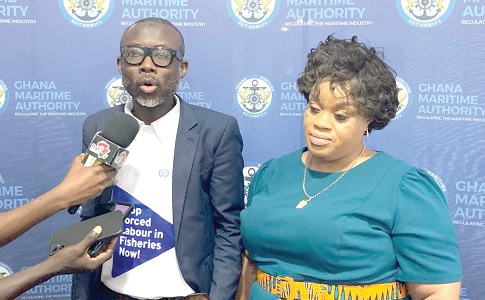The National Tripartite Work in Fishing Committee has commenced work to implement the International Labour Organisation's (ILO) Work in Fishing Convention 188.
In August 28 last year, Ghana ratified the convention aimed at improving the living and working conditions of fishers on vessels, especially those 24 meters and above; however, it came into full force in 2025.
The Chairman of the National Tripartite Work in Fishing Committee, Awudu Enusah, stressed that the committee would ensure that the requirements, which among others include the provision of decent accommodation, food, medical care, and regulated working time for fishers, were complied with.
“The committee will inspect vessels to ensure compliance with the convention's provisions, including decent sleep areas with mattresses, bedsheets, and blankets, functional washrooms with adequate water supply, toilets on board vessels, medical certificates for fishers, compliance with labour laws, including wages, Social Security and National Insurance Trust (SSNIT), and workman's compensation,” he said.
Mr Enusah was addressing a stakeholders’ engagement in Accra last Thursday.
The meeting had in attendance officials from the Ghana Maritime Authority (GMA), the Labour Department, the Fisheries Commission, the Maritime and Dockworkers Union, the National Union of Seamen, Port and Allied Workers, Ghana Industrial Trawlers Association and the Ghana Tuna Association.
Certificates
Mr Enusah added that the GMA would commence the issuance of the Maritime Labour Certificates to trawlers from this month, to coincide with the fishing season for the trawlers.
“The certificates will ensure that vessels provide decent living and working conditions for fishers.
The inspection process will cover labour conditions on board vessels, including living and working conditions,” he stated.
He affirmed that the convention recognised that the vessel is both the home and workplace of the fisher.
Therefore, it required that the sleep areas and work areas be habitable and meet certain standards.
Adding that vessels that do not comply with the convention's provisions would not be allowed to sail.
Compliance
The General Secretary of the National Union of Seamen, Port and Allied Workers, Michael Angmor, said the union is positive that all stakeholders would comply with the requirements, as failure to do so would result in vessels not being able to sail.
The implementation of the convention, he said, is expected to improve the lives of fishers and promote sustainable fishing practices in the country.
He said the ML Certificate would be issued to vessels that meet the requirements of the convention, including decent living and working conditions, medical care and compliance with labour laws.
Mr Angmor added that the certificate would be a crucial document for vessels to operate, and the authority would work closely with stakeholders to ensure compliance.
Challenges
The Financial Secretary of the Ghana Industrial Trawlers Association, Jerome Selorm Deamesi, highlighted the costs associated with meeting the convention's requirements, including training seafarers and retrofitting vessels to provide decent living and working conditions.
He said that while the cost of training is high, many seafarers leave Ghana after being trained to work in European countries, resulting in a loss of investment for the industry.
He stated that the association had trained over 600 seafarers, but had lost most of them to overseas jobs.
Mr Deamesi proposed that localising certification would help to prevent seafarers from leaving the country, stressing that seafarers should not be allowed to use their certificates to work abroad without paying the full cost of training.
This, he said, would help to ensure that the industry can recoup its investment in training this critical workforce.

